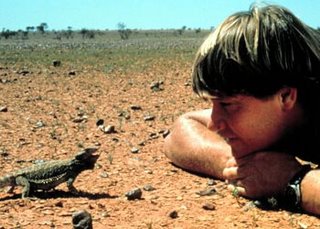Crikey...
 My first encounter with Steve Irwin was eerily prophetic.
My first encounter with Steve Irwin was eerily prophetic.One night in high school, a friend told me to turn on Animal Planet to “watch a complete lunatic in a safari outfit narrowly avoid death.”
I proceeded to watch my first episode of “The Crocodile Hunter,” fascinated by what I was seeing. Irwin, the Crocodile Hunter, was playing with extremely poisonous cobras and the creatures were obviously irritated. At one point, a cobra struck at him and he dodged its attack, which missed his hand my mere inches. Irwin, more winded than startled, remarked, “Crikey! That was a close one!”
Now, here we are five years later dealing with the news that Steve Irwin has died doing what he loved: studying animals and educating others about them. I always half-heartedly joked that Irwin was going to get himself seriously hurt or even killed one day, as evidenced by episodes of his show where he frolicked with lions, elephants and dangerous reptiles. Yet never once did I honestly believe it would actually happen.
Nor did I think it would happen the way it did.
When I jokingly said Irwin could get himself killed, I always thought it would be as a result of messing with a truly dangerous animal – mauled by a tiger or, in a twist of “Grizzly Man”-esque irony, eaten by a crocodile. Instead, Irwin met his end at the hands of what many wildlife experts call “the pussycat of the sea.”
Some may remember a few years back when Irwin took flak for feeding a crocodile with his infant son in his other hand. People were appalled and called him irresponsible, saying it was emblematic of his “risky behavior.”
I didn’t see it the same way.
This wasn’t Michael Jackson holding his child over a balcony. Yes, Irwin’s actions were unwise, but they showed how much trust he placed not only in himself, but in the animals he studied. He was confident in his ability to protect his son and to interact with dangerous creatures. In an interview with Larry King shortly after this happened, Irwin said that if he treated animals respectfully and understood them and their ways of life, he had nothing to fear. Some have suggested that Irwin did these outrageous things for ratings and that his death is a sign that people will only meet tragic ends trying to please fickle audiences.
This is a shoddy argument, one that would make sense only if Irwin had died doing something universally dangerous. And even then, I’m not sure. Being killed by a sting ray has to be one of the rarest deaths in the entire world. The fact that CNN had to run a story after Irwin’s death where it interviewed marine biologists who assured people that sting rays aren’t dangerous shows how truly outrageous this whole tragedy is. I wouldn’t be that shocked if sting rays, in the 2000s, develop a reputation like sharks in the 70s when “Jaws” came out.
Regardless of the circumstances or how he was viewed by the public, Irwin’s death is profoundly sad. Not just because he was so young or because he had two young children, but because he was someone who had so much to offer. It’s extremely rare that someone gets so much pleasure out of pleasing and educating others. Irwin didn’t do what he did for thrill-seeking or because he was attention-starved. There’s a difference between taking risks Steve Irwin-style and taking risks David Blaine-style.
Irwin interacted with these dangerous animals to educate people about them and to show them what they were missing sitting in their houses. Or perhaps, more importantly, what they stood to lose from the world if the environment continued to be destroyed.
The Prime Minister of Australia offered Irwin’s family a state funeral (which they fittingly declined because Steve was “an ordinary bloke”) for a man who was an Australian folk hero. I tried to think of a figure in America whose death would be reacted to in a similar fashion. Who is a true American folk hero like the Crocodile Hunter, I thought?
In perhaps the greatest compliment to Steve Irwin and his family, I couldn’t think of anyone.

0 Comments:
Post a Comment
<< Home